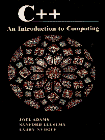
Synopsis
Offers students an introduction to traditional computing, covering such areas as scalar objects, the concept of I/O, reusability, control structures, functions and parameter passing, and modular programming. The text then covers non-scalar (class) objects to illustrate more fully the power of C++ objects.
"synopsis" may belong to another edition of this title.
Product Description
In the Second Edition, these best-selling authors provide the beginning computer science student or professional with an understanding of the discipline, methodologies, and techniques of programming as they apply to the broad field of computing. The authors' successful pedagogical aids such as real-world exercises and projects, Quick Quizzes, and Programming Pointers are continued in the Second Edition. KEY FEATURES: Parts of the Picture sections introduce students to the discipline of computer science - ethics, artificial intelligence, computer architecture, and networking. New sections have been contributed by experts in the field such as William Stallings. NEW - This edition uses the "spiral" approach to learning in which central topics are introduced early and then revisited in increasing detail throughout the text. NEW - Includes an introduction to the Standard Template Library. NEW - Problem-solving methodology is used consistently in examples and applications that gradually increase in complexity. NEW - A new approach to design, Object-Centered Design (OCD), is introduced in Chapter 1, and emphasizes using reusable program components. Students build their own libraries of useful functions and learn first-hand how to write programs from existing components.
From the Publisher
Introduces key ideas behind object-oriented programming in an intuitive and unintimidating way. C++: An Introduction to Computing gives students a solid introduction to traditional computing--scalar objects, and the concepts of I/O, reusability, control structures, functions and parameter passing, and modular programming--and then proceeds to non-scalar (class) objects, to more fully illustrate the power of C++ objects. The programs in the text have been tested for correctness using two common compilers, Turbo C++ (for DOS or Windows) and GNU C++ (for UNIX). Differences between the compilers are documented extensively-- enabling beginning programmers to solve problems in any of the three most common operating environments. The text uses multiple examples and pragmatic, realistic programs to illustrate topics. Reusable program components and good documentation, for easily maintainable programs, are emphasized--in both the presentation and examples.
"About this title" may belong to another edition of this title.
Search results for C++: An Introduction to Computing
C++: An Introduction to Computing
Seller: HPB-Red, Dallas, TX, U.S.A.
Paperback. Condition: Good. Connecting readers with great books since 1972! Used textbooks may not include companion materials such as access codes, etc. May have some wear or writing/highlighting. We ship orders daily and Customer Service is our top priority! Seller Inventory # S_423169253
C++ : An Introduction to Computing
Seller: Better World Books: West, Reno, NV, U.S.A.
Condition: Good. 1st. Used book that is in clean, average condition without any missing pages. Seller Inventory # 52594563-75
C++: An Introduction to Computing
Seller: ThriftBooks-Atlanta, AUSTELL, GA, U.S.A.
Paperback. Condition: Fair. No Jacket. Readable copy. Pages may have considerable notes/highlighting. ~ ThriftBooks: Read More, Spend Less. Seller Inventory # G0023694025I5N00
C++: An Introduction to Computing
Seller: Bay State Book Company, North Smithfield, RI, U.S.A.
Condition: good. The book is in good condition with all pages and cover intact, including the dust jacket if originally issued. The spine may show light wear. Pages may contain some notes or highlighting, and there might be a "From the library of" label. Boxed set packaging, shrink wrap, or included media like CDs may be missing. Seller Inventory # BSM.NIIW
